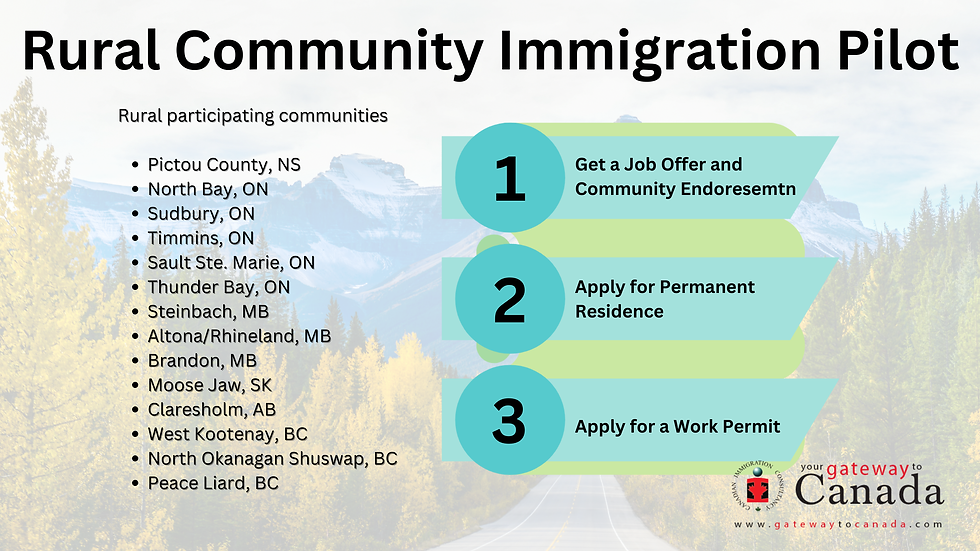Canada Launches New Programs: Rural Community Immigration Pilot (RCIP) and the Francophone Community Immigration Pilot (FCIP)
- PIACORP Consultancy

- Jan 31, 2025
- 4 min read

In an exciting development for Canada's immigration strategy, the Government of Canada officially launched two new immigration pilots in January 2025: the Rural Community Immigration Pilot (RCIP) and the Francophone Community Immigration Pilot (FCIP). These initiatives are part of a broader effort to address demographic challenges, boost economic growth, and foster more inclusive, sustainable communities across the country.
The Rural Community Immigration Pilot and Francophone Community Immigration Pilot are designed to attract skilled immigrants to rural areas and Francophone communities outside Quebec—regions that have long faced labor shortages and population decline. These pilots offer targeted support to ensure that newcomers can successfully settle and contribute to the growth of these communities.
Background: A Step Forward in Rural and Francophone Immigration Policy
The Rural Community Immigration Class (RCIC), which forms the foundation of the RCIP, was first outlined through Ministerial Instruction and officially published in the Canada Gazette on December 14, 2024. The RCIC aims to tackle labor shortages, economic stagnation, and demographic shifts in rural and smaller communities across Canada. By creating pathways for immigrants to settle in these regions, the RCIP seeks to revitalize local economies and foster sustainable growth in areas that need it most.
Similarly, the Francophone Community Immigration Pilot (FCIP) is designed to strengthen the presence of French-speaking Canadians outside Quebec. This pilot addresses the growing need to support the Francophone population in various regions while helping preserve and promote the French language and culture across the country.
Participating Communities - Rural Community Immigration Pilot (RCIP)
The following communities have been selected to participate in the Rural Community Immigration Pilot (RCIP):
Pictou County, NS
North Bay, ON
Sudbury, ON
Timmins, ON
Sault Ste. Marie, ON
Thunder Bay, ON
Steinbach, MB
Altona/Rhineland, MB
Brandon, MB
Moose Jaw, SK
Claresholm, AB
West Kootenay, BC
North Okanagan Shuswap, BC
Peace Liard, BC
These rural communities are seeking to attract skilled workers to fill labor shortages in sectors such as healthcare, agriculture, and technology. The pilot will help provide job opportunities and settlement services to immigrants, enabling them to thrive in these regions.
The Francophone Community Immigration Pilot (FCIP) will involve the following regions:
Acadian Peninsula, NB
Sudbury, ON
Timmins, ON
Superior East Region, ON
St. Pierre Jolys, MB
Kelowna, BC
These communities are working to attract French-speaking immigrants who can contribute to the local economy and help preserve the French language and culture, ensuring that Francophone communities continue to thrive outside of Quebec.
Why These Pilots Matter
Addressing Labor ShortagesCanada’s rural regions face a significant challenge with labor shortages in key sectors, including agriculture, healthcare, and natural resources. These gaps have hindered the economic potential of many rural communities. The RCIP is designed to encourage skilled immigrants to settle in these areas, filling vital roles that are critical to local economic growth and prosperity.
Supporting French Language and CultureOutside Quebec, Francophone communities are experiencing demographic shifts, with many younger French speakers moving to larger cities. The FCIP aims to reverse this trend by attracting more French-speaking immigrants to these regions, ensuring the survival and growth of French culture and language across Canada.
Encouraging Long-Term SettlementThese pilots are also designed with long-term settlement in mind. Rather than simply addressing short-term labor needs, the RCIP and FCIP focus on helping immigrants settle, integrate, and build a future in their new communities. This comprehensive support is intended to foster lasting connections between newcomers and their host communities, promoting economic and social cohesion.
How the Pilots Will Work
Both the Rural Community Immigration Pilot (RCIP) and the Francophone Community Immigration Pilot (FCIP) offer tailored support to help immigrants successfully integrate into their new communities. These supports include:
Job Placement Assistance: Employers in participating communities will work directly with the program to offer employment opportunities to newcomers, addressing the labor needs of these areas.
Settlement Services: Immigrants will receive assistance with housing, education, language training, and community integration, making the transition to life in a new community as smooth as possible.
Cultural and Linguistic Support: The FCIP will ensure that French-speaking immigrants have access to services in their language, helping them maintain their cultural ties while contributing to the community.
Local employers, community leaders, and settlement agencies will collaborate to create a supportive environment for immigrants, helping them build their lives in rural and Francophone regions of Canada.
Click here to find a job offer from participating communities.
Looking Ahead
The Rural Community Immigration Pilot (RCIP) and Francophone Community Immigration Pilot (FCIP) are an important step forward in Canada’s immigration strategy. By targeting rural areas and Francophone communities, the government is addressing key challenges such as labor shortages and demographic decline while ensuring that Canada’s linguistic and cultural diversity continues to thrive.
As the pilots move forward, they will be closely monitored and adjusted as necessary to ensure they meet the needs of both immigrants and host communities. The success of these pilots could lead to broader changes in Canada’s immigration policies, encouraging more immigrants to settle in regions outside of Canada’s major urban centers.
Conclusion
The launch of the Rural and Francophone Community Immigration Pilots represents a bold new approach to immigration in Canada. By focusing on regions that need population growth and skilled workers, these programs aim to build stronger, more sustainable communities across the country. For immigrants, these pilots offer unique opportunities to make a lasting impact in rural and Francophone communities, while contributing to the country’s continued success.
Canada’s long-standing commitment to diversity and inclusion is reflected in these initiatives, which aim to create a brighter future for all Canadians, regardless of where they live. Whether you’re a skilled worker, entrepreneur, or French speaker looking to settle in Canada, these new pilots offer an exciting chance to become part of the country's growth and success story.








Comments